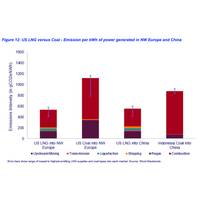US LNG Export Bill Clears Hurdle
A U.S. House subcommittee voted on Wednesday to advance a bill that would eliminate the need for government approval of U.S. liquefied natural gas (LNG) exports to countries that belong to the World Trade Organization.
The legislation, which will be considered by the full House energy committee, would essentially end the Energy Department's review of LNG export applications by giving companies permission to sell gas to any of the more than 159 countries that belong to the WTO.
The bill passed by a vote of 15 to 11, along party lines in the Republican-led chamber.
Concerns about energy security in Europe and Ukraine have escalated since Russian forces seized control of the Crimean peninsula last month. Moscow has in years past cut gas supplies during regional disputes.
Backers of the bill said speeding up the review process would help lessen Russia's influence in the region by providing another source of gas for global markets.
"Opposing this legislation is like hanging up on a 911 call from our friends and allies," said Colorado Republican Cory Gardner, who introduced the bill.
The bill will likely pass the House, but will face a tough battle in the Senate, where Democrats hold the majority.
Democrats on the subcommittee voted against the bill, saying it was unlikely to provide any immediate assistance to Europe or Ukraine since significant U.S. LNG export capacity will not be in operation until 2017 at the earliest and most of the U.S. gas would be headed for Asia.
Henry Waxman, the top Democrat on the House energy committee, raised concerns that the legislation was too broad.
Opponents of unfettered U.S. gas exports have argued that shipping too much could cause fuel prices to rise in the United States, hampering economic growth.
"We want to ensure that American consumers and manufacturers are not harmed by unlimited LNG exports," Waxman said.
Currently, gas exports to all but a handful of countries with free trade agreements with the United States require an export license from the Energy Department.
The review of whether each export application is in the national interest allows regulators to consider the economic ramifications of these projects, supporters of the permitting process argue.
The department has issued seven such approvals, but with about two dozen applications still in the queue, critics have complained the department is not moving fast enough.
The House bill would not affect the Federal Energy Regulatory Commission's review of the safety and environmental impact of LNG export facilities.
Companies would still need permission from FERC before they could begin construction of a LNG project.
(Reporting by Ayesha Rascoe; Editing by Jeffrey Benkoe, Bernard Orr)












